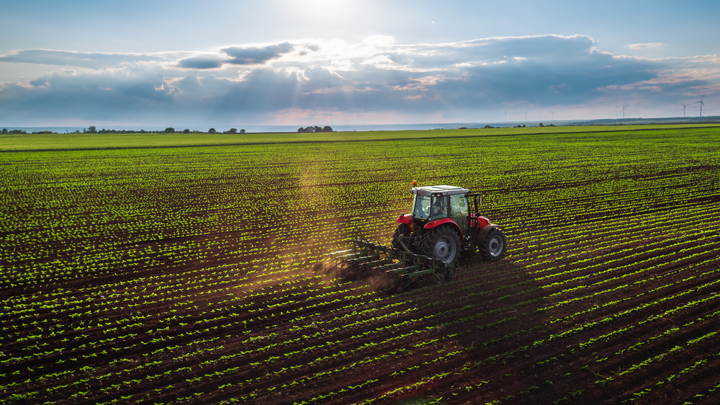IBISWorld presents a collection of fast facts for the different sectors of the UK economy.

Agriculture, Forestry & Fishing
- The AHDB reported that consumer trust in farming reached a six-year high in 2024, driven by rising consumer interest in farming and food production and origin.
- In the Autumn Budget 2024, the government introduced a £1 million limit on the inheritance tax relief for farms from April 2026, after that there would be a 50% relief, at an effective rate of 20%. The National Farmers’ Union (NFU) of England and Wales has labelled the Budget as “a blow to British farmers and could lead to food price rises.” Farmers have warned these measures could result in farmers selling up and taking part in protests.
- Following the budget announcements, the ADHB has stated that the “average farm holding value of £2.2 million would incur £240,000 inheritance tax from April 2026”, meanwhile farming confidence has plunged to the lowest level since 2010.
- On 19 November, thousands of farmers, led by the NFU, gathered at Westminster to protest against the government’s new inheritance tax policy. Around 1,800 members participated, seeking to overturn the policy due to concerns about its impact on succession planning.
- According to the Minister of State at the Department for Environment, Food and Rural Affairs (DEFRA), Daniel Zeichner, “fewer than 500 farms will be affected”. Nonetheless, farmers are set to carry out another protest rally in central London on 11 December.
- Labour also announced an accelerated reduction in the Rural Payments Agency’s delinked payments, which support production on many farms. The government plans to cut base payments by at least 76% in 2025, which will harm farmers' livelihoods and negatively impact output.
- According to data from the Energy and Climate Intelligence Unit (ECIU), harvests in England are down by between 75% and 33%, depending on the region, marking the second worst harvest on record. Fears about next years’ harvest are also swelling.
- According to Rivers Trust, only 14% of UK rivers are in good ecological health. The National Farmers’ Union (NFU) has claimed that farmers can prevent river pollution if they receive the necessary funding.
- Defra reports that farming contributes about 12% of the UK's total greenhouse gas emissions. The National Farmers' Union warns that achieving net-zero farming by 2040 is unlikely without increased investment in climate-friendly measures. The current government has kept the 2025-26 climate-friendly farming budget at £2.4 billion, unchanged from the previous level.
- On 4 December, the UK reached a landmark agreement with the EU and Norway, securing nearly 300,000 tonnes of fishing opportunities in the North Sea for 2025. This deal grants UK quotas valued at up to £310 million for species like cod, haddock and herring, promoting sustainable marine stock management.

Mining
-
The Office for National Statistics states that output in the mining and quarrying sector grew by 3.7% in September 2024. This was mainly driven by a 4.3% rise in extraction of crude petroleum and natural gas. Mining and quarrying remained flat in the three months to September 2024 compared with the prior quarter.
-
In the Autumn Budget 2024, the government confirmed the hike in the Energy Profits Levy (windfall tax) from 35% to 38%, removing the 29% investment allowance and extending the tax until the end of March 2030.
-
Apache, a US oil firm, has announced it will exit its North Sea operations by the end of 2029 due to the hike in the windfall tax.
-
World Bank Commodities Price Data released in December 2024 shows that the monthly average prices for coal and crude oil fell in November 2024 after a slight hike in October 2024. Metals and minerals monthly average prices have followed suit, with aluminium, copper, lead, iron ore and zinc prices falling. Precious metals (gold, platinum and silver) have also recorded a dip in prices.
-
According to BDO’s UK Oil and Gas Annual Report 2024, the UK oil and gas industry contributed US$13.2 billion to the UK economy in 2023. While oil production and consumption are strong, the industry is investing in AI, carbon capture and renewable energy. However, according to the report, the majority of the largest UK-based oil and gas companies recorded a drop in revenue.
-
The Financial Times reports that major oil and gas companies, Shell, Ithaca and Equinor, will admit that the UK government made a legal error in granting them licenses for two new offshore developments, Rosebank and Jackdaw. However, they will argue that they should continue with the projects.

Manufacturing
- In November 2024, the UK manufacturing sector continued to contract, with the Manufacturing PMI dropping to 48 from October's 49.9. This reflects the steepest decline in new order intakes since February, leading to reduced staffing, purchasing and inventory. Weaker domestic and international demand, particularly from the US, China and EU, contributed to this downturn. Supply chain disruptions, including the Red Sea crisis, border regulatory issues and North American port disruptions, have intensified the sector's struggles.
- On 15 November 2025, the Prime Minister pledged £975 million across five years to drive growth and jobs across the UK aerospace industry. Following the news, UK-based aerospace corporation Babcock has joined the UK manufacturers’ trade association, Made in Britain, while BAE Systems is set to create 350 new jobs across the South of England in 2025.
- EV manufacturers and sales face pressure under the government’s “electric vehicle” mandate. which dictates a percentage of cars sold must be EVs. Punitive fines of £15,000 per car will be imposed on companies that fall short of those targets. The Society of Motor Manufacturers and Traders (SMMT) reports that EV sales have grown for the 11th consecutive month, reaching 25% of new car sales in the UK in November. However, the 2024 target mandates that 22% of sales must be EVs and the current figure stands at 18.7%.
- On 27 November 2024, the Welsh government welcomed a £51 million investment from US electronics giant Vishay Intertechnology into the former Newport Wafer Fab semiconductor plant, which is set to boost semiconductor production and create new job opportunities.
- According to the ONS, monthly production output was estimated to have decreased by 0.5% in September 2024; this follows a decrease of 0.7% in July 2024 and an increase of 0.5% in August 2024 (both unrevised). The drop came thanks to a fall in eight out of 13 subsectors – with the largest downward contribution coming from basic metals and metal products (down 2.3%).

Utilities
- From 1 November 2024, the energy profit levy will rise from 35% to 38% – bringing the headline tax rate to 78% – to ensure oil and gas companies contribute more to make the UK a clean energy superpower. The levy will apply until 31 March 2030.
- The energy price cap is set to rise in January 2025, placing several vulnerable households with further hardship. On 22 November 2024, Ofgem announced that the new energy price cap from 1 January to 31 March 2025 will be £1,738 per year for a typical household, indicating a 1.2% increase from the previous price cap.
- The UK is one step closer to supporting the UK’s clean energy transition and boosting energy security. A £2 billion subsea and underground cable has been approved for Eastern Green Link (EGL1), which will carry 2GW of wind generated power from Torness, East Lothian, Scotland, to County Durham. The project is expected to save £870 million annually by cutting compensation paid to wind generators when grid capacity is insufficient.
- EDF Energy announced an extension for four ageing UK nuclear power stations to enhance energy security. Hartlepool and Heysham 1, originally set to close in March 2026, will now operate until March 2027, while Heysham 2 and Torness, planned for closure in 2028, will remain open until 2030. These extensions aim to compensate for delays in the Hinkley Point C power plant, now expected to be operational in 2029, at the earliest.

Construction
- The latest S&P Global report reveals that the UK Construction PMI rose to 55.2 in November 2024, up from 54.3 in October. This growth was fuelled by a surge in commercial work, thanks to stronger customer demand and new tender opportunities. House building lagged behind other sectors due to elevated borrowing costs and waning consumer confidence, which are tied to economic uncertainties stemming from the Autumn Budget.
- Despite a £5 billion pledge in the Autumn budget to support national housing targets, businesses are still awaiting clarity on major infrastructure projects and the outcome of the National Planning Policy Framework and the government’s housing strategy.
- To support the goal of building 1.5 million homes, Deputy Prime Minister Angela Rayner pledged to "unblock" stalled housing projects in the South East of England. A 165-home development in Kent, previously halted by the Conservative government, has now been approved.
- Data from the Department for Business and Trade showed that material price inflation fell by 0.8% in October 2024 compared to the same month in 2023. Despite this, material prices for New Housing registered a 0.5% increase, Repair and Maintenance was down by 0.1% and Other New Work decreased by 1.7% in the 12 months to October 2024. Flexible pipes and fittings saw the largest annual increase at 17.2%.

Wholesale Trade
- According to the Office for National Statistics, output in the wholesale and retail trade; repair of motor vehicles climbed 0.3% in September 2024. This was driven by wholesale and retail trade and repair of motor vehicles and motorcycles, which grew by 3.2%. Wholesale and retail trade; repair of motor vehicles and motorcycles output increased by 0.6% in the three months to September 2024.
- Confex and Fairway have merged to create a new wholesale buying group, The Wholesale Group. It is called the Wholesale Group. It will launch in January 2025 and will aim to support independent wholesalers. According to The Grocer, the group will represent 12% of UK wholesale, with a joint annual turnover of about £4.5 billion and about 350,000 customers.
- DBC Group has become a member of the Sugro UK group, which consists of over 90 independent wholesalers.
- Love British Food has called on wholesalers to promote domestic produce by launching ‘Buy British’ categories in a bid to boost demand.
- New figures show that trade with the EU has suffered severely due to Brexit, with Aston University estimating that annual exports and imports are 17% and 23%, respectively, below where they would have been if Brexit didn’t materialise.
- The government has again delayed the final stage of the post-Brexit border rollout for goods entering the UK from the EU by three months to the end of January 2025. Trade representatives have said this move hits business confidence, as reported by the Financial Times.

Retail Trade
-
Data from the British Retail Consortium data shows UK Total retail sales decreased by 3.3% year on year in November, against a growth of 2.6% in November 2023 – though the stark contrast is likely due to the Black Friday period falling into early December. Consumer confidence remained weak and the anticipated rise in energy bills deterred non-food spending. Shoppers weren’t in the mood for new clothing either with sales remaining weak, according to the BRC.
-
Amazon won during the Black Friday deal with a record number of items and sales during the 12 days between 21 November 21 to 2 December. UK residents gave the pre-loved market some attention with Amazon’s resale offer.
-
Having come under scrutiny for soaring debt levels, Asda has secured a further £155 million through a private loan to pay off looming debts, which is due for repayment 2031. In November 2024, the supermarket named former CEO Allan Leighton as its executive chairman, succeeding Lord Stuart Rose, in a bid to turnaround its poor financial performance.
-
Sustainability initiatives are gaining traction. In November 2024, M&S doubled the store footprint of its Beauty Takeback Scheme to an additional 60 stores, bringing the total to 100, in a bid to make the scheme more accessible to customers across the UK.
-
Retailers are on a cost cutting path as the Chancellor introduced increases to employers’ national insurance contributions (from 13.8% to 15%), and the national minimum wage from April 2025 – estimated to cost an additional £2.3 billion. Marks & Spencer CEO Stuart Machin has said he’d rather maintain prices rather than pass increases onto consumers. In contrast, Sainsbury’s warned they group won’t have the capacity to absorb the rises.
-
Online giant Temu is under fire from the European Commission for aggressive sales tactics including an addictive design, game like rewards and weak systems to mitigate against these risks. At the same time, online women’s clothing retailer Boohoo has come under fire for bringing back a supplier it had previously cut ties with following modern slavery allegations, while fashion brand Shein is targeting an early 2025 London IPO.
-
In October 2024, UK Ministers introduced the Employment Rights Bill, broadening workers’ rights and helping to ensure some stability. Key proposals include introducing rights from Day 1, including paternity leave, protection from unfair dismissal, establish bereavement leave and addressing the potentially exploitative nature of zero-hour contracts.
Transportation & Warehousing
- The Autumn Budget 2024 has included some measures that have affected the transport sector. Chancellor Reeves has decided to extend the freeze on fuel duty for another year and maintain the previous government's 5p cut. The £2 cap on single bus fares in England is set to rise to £3 from January 2025. Vehicle Excise Duty paid by owners of all but the most efficient new petrol cars is set to double in their first year. The budget for pothole repairs will also rise by £500 next year.
- The government has also committed to deliver the Transpennine rail upgrade between York and Manchester alongside funding for the tunnelling work related to the HS2 line to London Euston.
- The Air Passenger Duty to go up in 2026-27, by £2 for short-haul economy flights and £12 for long-haul ones, while rates for private jets are set to go up by 50%.
- Ryanair has warned that it may be forced to cut the number of its UK flights by 10% due to the tax hikes on air travel in the Autumn Budget. At the same time, private jet executives claim that the rise in private jet flight taxes will likely not put off wealthy passengers.
- On 25 November 2024, the Secretary of State for Transport launched the JetZero Taskforce to tackle aviation emissions. Its focus includes promoting sustainable aviation fuels, advancing zero-emission flights and enhancing aviation systems for greater efficiency.
- Sunak’s decision to downgrade HS2 has led to over £2 billion in costs, including a £1.1 billion write off during phase two (Birmingham to Manchester link) until it was scrapped in 2023. HS2 also disclosed a £1 billion accounting fee related to the downgraded line.
- Transport for London has warned that it’s facing a £250 million shortfall in funding after securing just half of the £500 million grant it had requested to keep the network running in 2024-25. The funding will be used for new trains on the Tube’s Piccadilly Line, which are being constructed in East Yorkshire.
- Following Labour's pledge to nationalise the railway network and create Great British Railways to replace Network Rail, the government announced plans on 4 December 2024, to take South Western Railway into public ownership. In May 2025, the contract held by FirstGroup and MTR will transfer to the DfT’s Operator of Last Resort.

Accommodation & Food Services
- The ONS states that output in the food and beverage service activities rose by 0.01 percentage points in September 2024 and was up 0.02 percentage points in the three months to September 2024. Output in food and beverage service activities increased by 1.3% in September 2024.
- The Autumn Budget 2024 brought bad news for the hospitality sector, with hospitality businesses warning that the measures will result in severe job cuts and the collapse of many businesses. The government raised employers’ NI contributions from 13.8% on salaries above £9,100 to 15% on salaries above £5,000 from April 2025. Meanwhile, the minimum wage for those over 21 will reach £12.21 in April 2025, a 6.7% hike from the current rate. UKHospitality analysis states these increases will mean that it will cost hospitality businesses an extra £2,500 to employ a full-time staff member and covering the full extra costs would require a 6% hike in prices. Alcohol taxes will rise in line with the retail price index, though the tax on draught drinks will be cut by 1.7%, saving consumers just a penny off a pint in the pub.
- Pub chain JD Wetherspoon faces a £60 million hike in taxes and business costs from the measures laid out in the Autumn Budget. It warns that hospitality businesses will be forced to increase prices.
- Deutsche Bank forecasts that the Budget measures will result in UK bakery Greggs seeing costs hike by £97 million over the next two years.
- Over 200 hospitality industry bosses have signed a letter from trade body UKHospitality to UK Chancellor Rachel Reeves warning that the hike in the NI tax will result in severe job losses and business closures.
- The higher employment costs amid the new Budget measures are forcing some smaller UK pub and hostel operators to rethink operations, including closing sites, halting expansion or redirecting investments away from the UK. For example, Wells & Co has cancelled a planned acquisition in the UK and put a hiring freeze in place, shifting their focus to expansion in France. The company’s chief executive Peter Wells has said that the Budget will add £700,000 to their expenses, reducing profit by 20%, as reported by The Financial Times.
- Food chain Nando’s, which reported sales above pre-pandemic levels, is planning to expand its presence in the UK by opening 14 new restaurants in total in the year to February 2025. By the end of November 2024, it had opened nine sites in the UK this financial year.
- The UK Tourism Minister has announced a new ambition for the UK to welcome 50 million international visitors per year by 2030. This is part of the government’s plan to remain one of the most visited globally and help drive economic growth. The tourism industry is worth £74 billion to the economy and represents 4% of GVA.

Information
- According to the Office for National Statistics, output in the information and communication sector dropped by 2% in September 2024. It represented the largest negative contribution in the services sector. The largest contribution came from a 2.6% fall in computer programming, consultancy, and related activities, as well as a 3.6% drop in publishing activities and a 1.1% fall in telecommunications. Programming and broadcasting activities expanded by 1.8%.
- UK telecoms giant BT Group has said that measures from the Budget will result in around a £100 million hike in costs, mainly due to the increase in the rate of employer national insurance contributions.
- Virgin Media O2 has sold a £186 million (about 8%) stake in its mobile masts business, Cornerstone, to infrastructure investment firm Equitix. The company retains 25% holding in Cornerstone, which is the UK’s largest mobile towers business.
- The Competition and Markets Authority has provided some optimism for Vodafone’s £16.5 billion merger with Three UK “if the companies committed to delivering on the £11 billion plans to upgrade the merged company’s UK network, including the rollout of 5G”, as reported by The Financial Times. The competition watchdog will give its final decision on whether the merger can proceed by 7 December 2024.
- The head of the National Cyber Security Centre (NCSC) states that the UK is experiencing a growing gap in its ability to address cyber threats due to the increased scale and intensity of attacks driven by AI and readily available technologies. According to the NCSC “severe” attacks on UK companies have tripled over the past 12 months.

Finance & Insurance
- To attract more businesses, the UK government is considering a series of reforms to captive insurance. Captive insurance is a form of self-insurance and is one of the fastest growing segments in the global market. The consultation document outlines potential changes, including lower capital requirements, reduced application fees, a faster authorisation process and reduced ongoing reporting requirements for captive insurers.
- Buy-Now-Pay-Later (BNPL) platforms are booming, with US Affirm entering the UK market in November 2024. New legislation – like safeguards against unaffordable borrowing and credit card-style protection – is set to come into play in 2026 to protect consumers. FCA research found 14 million customers had used BNPL in 2023, and frequent users were four times more likely to have a missed payment than those who had not used the loans.
- Mortgage rates rise despite rate cuts as inflation hovers above the Bank of England’s 2% target. Moneyfacts reported that the average new five-year deal was priced at 5.23% on the week commencing 18 November 2024, a rise from 5.14% the week prior.
- The Financial Conduct Authority encourages the use of AI to bring down premiums. However, it has warned that in areas like health coverage, personalisation may lower costs for some consumers, but also increase costs or push out potential consumers who are unhealthier or don’t have access to technology.

Real Estate and Rental and Leasing
- According to major bank Nationwide, annual house price growth increased by 3.7% in November 2024 compared with November 2023. Prices climbed by 1.2% month on month, with the average house price at £268,144. This marks the fastest rate of annual growth since November 2022. Resilient labour market and strong income gains have supported housing market activity in 2024.
- The Chancellor announced a hike in the levy on second homes and buy-to-lets from 3% to 5%. The National Residential Landlords Association states that the supply of rental homes will suffer as a result, while Rightmove estimates the measure results in an additional £7,000 stamp duty cost for a landlord purchasing an average home.
- Tenants are facing higher rent prices amid a squeeze in housing supply. According to the Royal Institution of Chartered Surveyors, the supply of new properties on the market was the weakest since 2021.
- ONS data shows that average private rents swelled by 8.7% in the 12 months to October 2024, the fastest rate since April 2024 and signalling even more challenges for tenants who have faced significant hikes in costs.
- According to Savills, the UK is showing a resurgence in the office market, accounting for 29% of total European office deals in the first half of 2024. It is performing better than its European counterparts like France and Germany.
- BNP Paribas Real Estate estimates that the UK real estate market has the potential to be worth an additional £470 billion by 2029 if the UK can address the current supply shortfalls.
- Border to Coast Pensions Partnership, one of the UK’s largest pension pools, has launched a £1.2 billion UK real estate fund, with the aim to expand the fund to over £3 billion in the next five years.
- Canadian asset manager Brookfield has committed £900 million in new equity to support Canary Wharf’s debt refinancing.
- Research from Transparency International UK has found that since 2016, nearly 500 UK properties worth £5.9 billion have been acquired by organisations registered in the British Overseas Territories.

Professional, Scientific & Technical Services
- The Office for National Statistics reports that the professional, scientific and technical activities sector grew by 0.5% in September 2024. It was the largest positive contributor in the services sector over the month. Five out of the eight industries in this section experienced growth in September 2024. The growth was driven mainly by an increase of 3.2% in the scientific research and development industry. Professional, scientific, and technical activities was also the largest positive contributor to the hike in services output in three months to September 2024, growing by 0.7%.
- BDO has reported a record revenue of over £1 billion, rising by 8.6% on the back of higher investment in digitisation and staff. At the same time, despite adverse economic conditions, operating profit climbed 15% to £227 million. This is in contrast to the Big Four firms which have cut staff and faced weak demand due to the heightened economic uncertainty.
- According to data from Dealogic, dealmaking involving UK companies has outstripped the rest of Europe since the start of 2024, with the value of merger and acquisition (M&A) surging by 57% compared with the same period last year. The value of M&A activity in the UK was over twice that of second-placed Germany.
- Data from the Advertising Association and WARC forecasts a record £10.5 billion ad spending in the UK during the Christmas season. Last year, ad spending during the period reached £9.7 billion. Spending on search engine advertising and online display ads is forecast to climb strongly by 9% and 15.8%, respectively. Meanwhile, TV advertising spend is falling, with a 5% drop forecast, as advertisers focus on online channels.
- The Advertising Standards Authority has banned Eurostar’s £39 ticket adverts for the second time, claiming there was no evidence enough seats were available for purchase at this price and it misleads consumers.
- According to the Institute of Practitioners in Advertising, marketing budgets failed to expand in the third quarter of 2024, for the first time since the pandemic. This was due to heightened uncertainty among businesses in anticipation of the Autumn Budget.
- Starting next year, certain breakfast cereals and snacks, including pitta bread, rice cakes and sugar-added tea and coffee, will be part of the UK's junk food advertising ban. The rules also target ready meals, stuffed pasta, confectionery, soft drinks, ice cream and pizza. This ban aims to curb children's exposure to high-fat, sugar, or salt foods by restricting ads online or before 9pm on TV. The UK government expects to remove 7.2 billion calories annually from children's diets, potentially preventing an estimated 20,000 childhood obesity cases.

Education
- Three universities face student visa action plans as the Home Office suggests breaches of sponsorship requirements as higher education becomes more reliance on international student revenues.
- The Independent Schools Council (ISC), a group representing 1,400 private schools across the UK, press ahead with plans to challenge the introduction of VAT from January 2025. The government estimates the additional tax income will amount to £460 million extra to spend on state schools next year. Critics argue with rising fees, parents and members of the ISC argue they cannot find alternative education for children in the state sector, while military veterans say army retention will worsen unless the government exempts military personnel from paying VAT on private school fees.
- Universities are in financial trouble and are having to take drastic actions to avoid going bust including culling courses and issuing voluntary severance schemes. The BBC says Queen’s University Belfast is on track to have a deficit of more than £11 million in the 2024-2025 academic year, with the University of York at £34 million and the University of Sheffield at £50 million.
- From Autumn 2025, university tuition fees in England will rise for current and existing students by £285 to £9,535 a year for those on full-time degrees. Despite increase, the Office for Students (OfS) warns a third of universities will be serious financial difficulty and must take bold and transformative action – like mergers or cost sharing to survive. The regulator had said it expected 40% of universities to be in financial deficit in 2023-24, but the figure increased drastically to 72% by 2025-26 with a £1.6 billion deficit across the sector.
- Private schools are expected to begin paying 20% duty but EU diplomats want international institutions to be exempt, fearing a mass exodus of students, particularly those in diplomatic services who only need placements every 2-3 years.
- UK education secretary, Bridget Phillipson, considers allowing local councils open new schools for the first time in more than a decade in an attempt to foster social mobility and develop institutions pupils will actually attend. Part of Phillipson’s plan includes allocating part of the £6.7 billion capital budget towards more special education units in schools.
- The percentage of disadvantage children in England pursuing further education has fallen for the first time on record. According to the Department for Education, 29% of students eligible for free school meals at 15 had progressed to university by the age of 19 in 2022-23, compared with 29.2% the previous year.

Healthcare & Social Assistance
- The NHS faces more pressure as flu, COVID-19, norovirus and respiratory syncytial virus (RSV) cases creep up. According to the first of this year’s NHS winter situation reports, an average of 1,099 flu patients were in beds in England each day over the last week of November, including 39 in critical care, and 95% of beds already occupied.
- The National Institute for Health and Care Excellence (NICE) final draft guidance on weight loss drug, Mounjaro, from March 2025 alongside advice on diet and exercise. Mounjaro will only be offered to those with a BMI over 25 and to those with obesity-related problems. Only those patients under the care of specialist weight-management services will be offered it initially – matching the approach taken with a similar weight-loss drug, Wegovy.
- Social care is chronically overlooked and underfunded with staffing shortages and a means-based system forcing people to sell homes to pay for care in later life. The Department for Health and Social Care estimates one in seven residents pays more than £100,000 for care – with more than a third of those living in nursing homes being “self-funded”.
- Healthcare workers have sounded the alarm over an overstretched A&E department over Winter. A survey by the Royal College of Emergency Medicine (RCEM) showed 83% of emergency doctors said patients were already cared for on trolleys in corridors, while 51% said they’d seen patients forced to wait outside A&E departments in ambulances.
- On 29 November 2024, MPs will vote on a proposed law to give terminally ill patients across England and Wales the right to choose to end their life. The proposal includes several safeguards, including a prognosis of six months to live and verification by two independent doctors at least a week apart.
- Pharmacies across the UK have said they’re willing to pause a number of services including free delivery and extended opening hours, unless the government boosts funding. For pharmacies, this may mean withdrawing from locally commissioned services including addiction support, emergency contraception and smoking cessation.
- The Chancellor has confirmed that the NHS will receive the funding needed to deliver an extra 40,000 elective appointments per week to reduce waiting times in the NHS. This includes an additional £1.8 billion the government has invested in elective activity this year since the July Statement. This will be supported by a significant investment uplift including surgical hubs and scanners, and funding for new radiotherapy machines to improve cancer treatment.
- From 1 January 2025, all medicines sold in the UK will need to be labelled as ‘UK Only’. The British Generic Manufacturers Association (BGMA) warns not all suppliers will have their labelling ready – potentially leading to shortage due to bureaucracy.

Arts, Entertainment & Recreation
- BBC has commissioned new art and culture programmes as part of its commitment to Art & Culture. New arts TV programmes unpack contemporary culture, celebrate British creativity and explore landmarks in the global story of art including Renaissance: The Blood and The Beauty, Simon Schama’s History of Us and the return of epic series Civilisations.
- There won’t be a tax hike on gambling after the 2024 Autumn Budget, but filings did state the government would consider how to consolidate the UK’s gambling tax structure in 2025. At present, UK remote gaming duty sits at 21% of profit, when the previous rate of 15% was raised in 2019. General betting duty is 15% of net stake receipts, which is comparable to the gross profits from bookmaking. In addition, pool-betting duty is 15% of pool betting receipts.
For more information on any of the UK’s 600+ industries, log on to www.ibisworld.com, or follow IBISWorld on LinkedIn.









